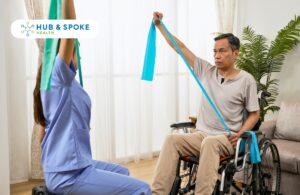The Power of Exercise During and After Cancer. How Hub and Spoke Health can help.
Dealing with cancer and undergoing chemotherapy can be physically and emotionally challenging. While cancer treatments like chemotherapy can cause various side effects, research has shown that exercise can play a crucial role in improving the physical and mental well-being of cancer patients. Exercise during cancer and chemotherapy has been found to have numerous benefits, from managing treatment-related side effects to improving overall quality of life.
Managing Treatment-Related Side Effects:
Cancer treatments like chemotherapy can cause side effects such as fatigue, nausea, muscle weakness, and decreased physical function. However, regular exercise has been shown to help manage these side effects. Exercise can help reduce fatigue by improving cardiovascular fitness, muscle strength, and endurance, which can help patients feel less tired and more energized. Exercise can also help manage nausea by releasing endorphins, the body’s natural feel-good hormones, which can help reduce feelings of nausea and vomiting.
Improving Physical Function:
Cancer and chemotherapy can sometimes lead to a decline in physical function, which can impact daily activities and quality of life. However, exercise can help improve physical function during cancer treatment. Regular exercise, including aerobic exercise, resistance training, and flexibility exercises, can help maintain muscle strength, joint flexibility, and cardiovascular fitness. This can allow cancer patients to maintain their independence, perform daily activities with ease, and enhance their overall quality of life.

Enhancing Emotional Well-being:
Cancer and chemotherapy can take a toll on a patient’s mental health, leading to increased stress, anxiety, and depression. Exercise has been shown to have a positive impact on emotional well-being during cancer treatment. Exercise promotes the release of endorphins, which can improve mood and reduce stress, anxiety, and depression. Regular exercise has also been associated with improved sleep quality, which is essential for overall well-being. Exercise can provide a healthy outlet for coping with the emotional challenges of cancer and chemotherapy, and can help patients feel more resilient and empowered.
Boosting Immune Function:
Cancer and chemotherapy can weaken the immune system, making patients more susceptible to infections and illnesses. However, exercise has been shown to have immune-boosting effects. Regular exercise can help improve immune function by increasing the production of immune cells, enhancing their function, and reducing inflammation. This can help patients better withstand the challenges of cancer treatment and reduce the risk of infections and complications.
Promoting Long-term Health:
Regular exercise during cancer and chemotherapy can also have long-term health benefits. Exercise has been associated with a reduced risk of cancer recurrence and improved overall survival rates in some types of cancer. Exercise can also help manage other chronic health conditions such as obesity, diabetes, and cardiovascular disease, which are risk factors for cancer and can impact long-term health outcomes. Incorporating exercise as a lifestyle habit during and after cancer treatment can promote better long-term health and well-being.
_______
Hub and Spoke Health offers mobile physiotherapy and exercise physiology services to help you on your journey to recovery. Our experienced clinicians can provide you with a customised exercise program that is tailored to your individual needs and can be completed in the comfort of your own home. We understand the challenges of cancer treatment and aim to support and guide you every step of the way.
Contact Hub And Spoke Health today to learn more about how we can help you on your journey to recovery.
Our clinicians are guided by The Cancer Exercise Toolkit, a best practice guide created by Dr Amy Dennett, A/Prof Catherine Granger, Dr Clarice Tang, Dr Christian Barton, Dr Christian Osadnik, Prof Nicholas Taylor and April Chiu.
Some of the most common barriers to exercise during cancer treatment are the following:
(Hefferon et al., 2013)

Hub and Spoke Health helps to overcome these barriers by bringing exerise to you. As one of our directors knows first hand, it can be difficuly to exercise whilst undergoing chemotherapy. The lack of time, fatigue and self esteem issues due to to hair loss, means exercise often takes a back seat over other self-care priorirties.
Some of the Benefits Of Exercising During/Post Chemotherapy
(D’Ascenzi et al., 2019)

Author
-

Hub & Spoke is a unique Allied Health service that delivers the latest in therapies and treatments to you both in-home or at work to make health care accessible to everyone.
View all posts
















